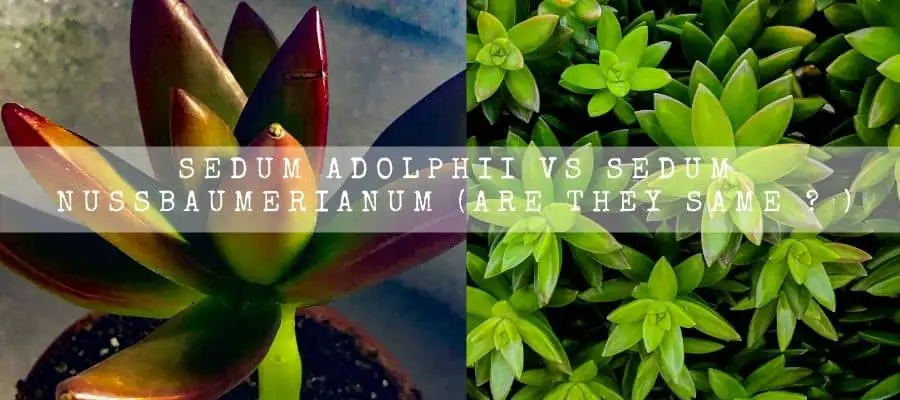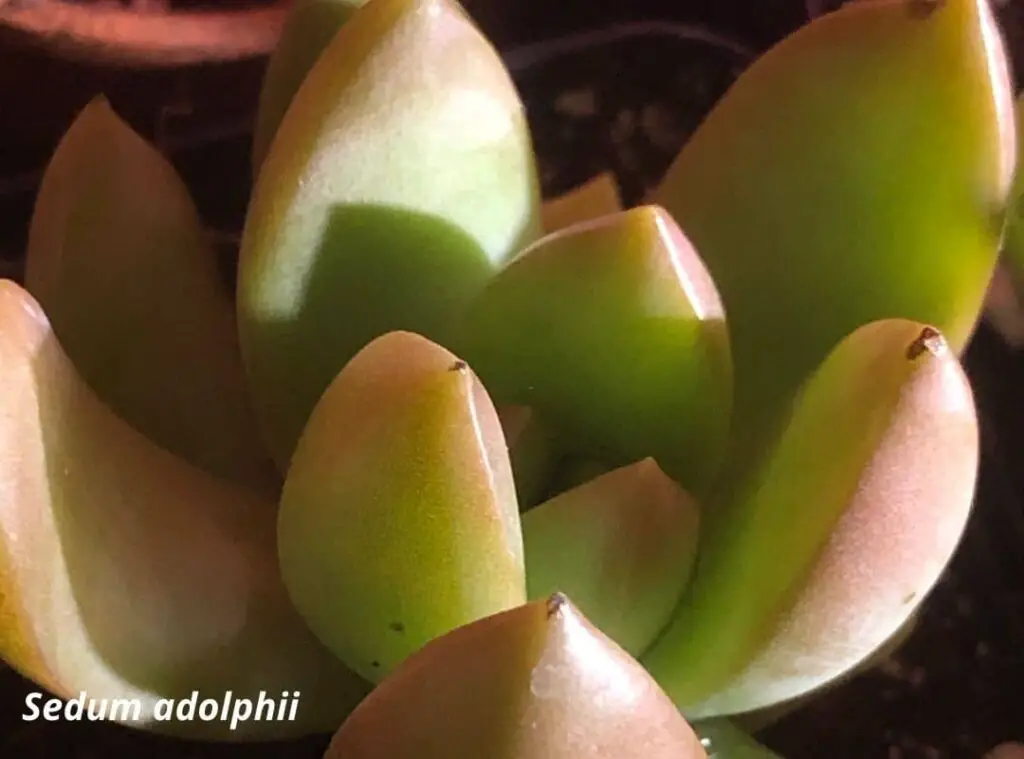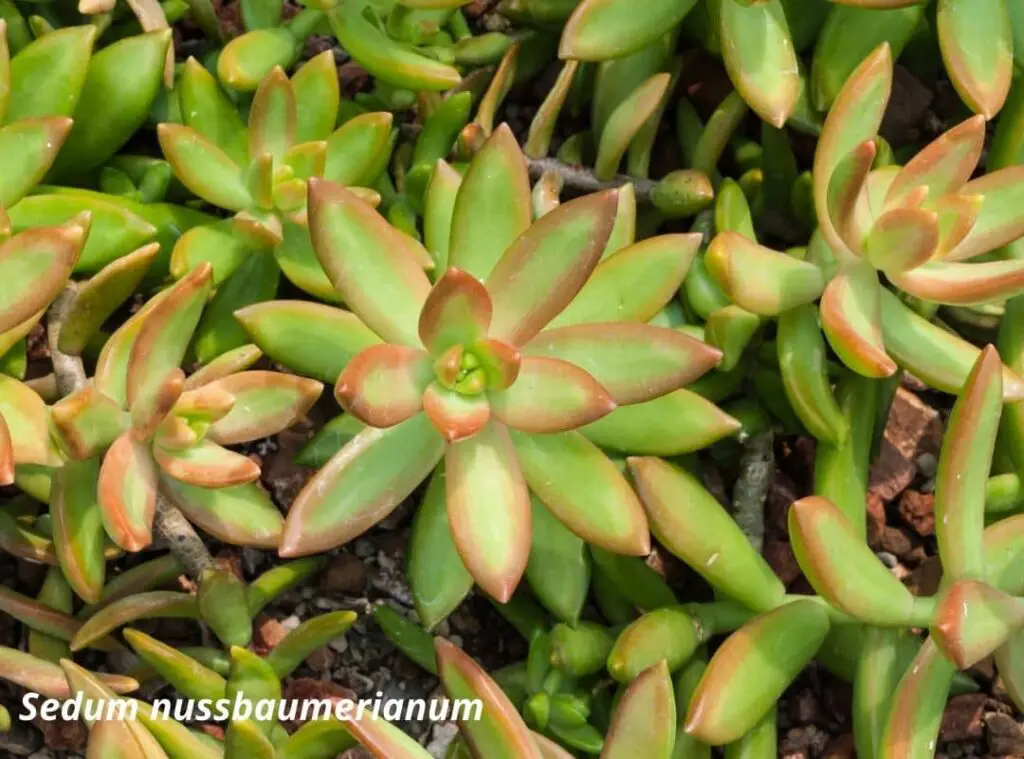In this article we are going to discuss about differences and similarities between beautiful Sedum adolphii vs Sedum nussbaumerianum

Sedum adolphii description
Sedum adolphii are versatile and charming succulents which anybody would fall in love with. They are trailing succulents which form in mini rosettes.
Those rosettes would be golden in color. The leaves of the Sedum adolphii leaves resemble a football.
When you expose them to adequate sunlight levels, their leaves would turn red. Usually the leaves of the Sedum adolphii would be dark green in color.
Those leaves would be banana shaped. Furthermore, Sedum adolphii produce flowers in white during spring. Sedum adolphii blooms tend to resemble the look of a star.
These are called golden glow and golden sedum in general, and they are a fast growing set of plants. in terms of the sizes, they would reach a maximum height of 12 inches (30 cm).
Further they would be about 24 inches (61 cm) in width. These are native plants in Mexico.

Sedum Nussbaumerianum description
Sedum nussbaumerianum are evergreen perennial plants. Once they get sufficient sunlight levels and go through stress they would tend to turn beautiful copper in color.
These would be great additions as ground covers. Moreover they would be useful for rock gardens too.
Sedum nussbaumerianum are unique and pleasing to watch. Sedum nussbaumerianum leaves also form in rosette shape and they would be thick.
Moreover, you could spot the Sedum nussbaumerianum leaves are forming in a pointed manner.
Their leaves usually grow in a almon shape as well. Many people use them as trailing groundcovers.They would grow up to 8 inches tall and 2-3 feet in diameter.
Sedum nussbaumerianum stems would be reddish brown in color. They would become wooly as they matured. They do not produce aerial roots though. Sedum Nussbaumerianum produce white flowers, and they consist of a light fragrance as well.

Similarities between Sedum adolphii vs Sedum nussbaumerianum
Both the Sedum adolphii, Sedum nussbaumerianum produce flowers in white.
You need to conduct the same care treatments for both these plants. Furthermore, they are all growing in a trailing manner. Both these plants form a rosette shape.
Differences between Sedum adolphii vs Sedum nussbaumerianum
When Sedum nussbaumerianum is in stress, they would turn copper in color. On the other hand, when Sedum adolphii leaves tips would turn red when they are in stress.
Sedum adolphii leaves would resemble a banana leaf while on the other hand, Sedum nussbaumerianum leaves would be almon shaped.
How to care for Sedum adolphii
Light and temperature
Sedum adolphii are fond of strong sunlight levels. Ideally, they would require full sunlight to partial shade.
To be precise, they would require full sunlight for about six hours on a daily basis. When you expose them to strong sunlight levels, their leaves become red and orange in color.
In terms of the right temperature levels, they are cold hardy plants. Hence If you live in much cooler areas, it would be safer to relocate the plants indoors.
Having said that they would not grow well as they do when grown in natural sunlight levels.
Watering and feeding
Sedum adolphii have typical water requirements just like the other succulents in general.
They hate to be in waterlogged conditions. Hence you need to assure whether your plants soil is dry and only then proceed with watering them. It will avoid any potential over watering situation.
When it comes to feeding the plants, you may feed them just once when they are actively growing particularly during spring and summer. You may use a diluted fertilizer at ¼ strength to feed them.
Soil and transplanting
Sedum adolphii can thrive well in any kind of soil mix. Having said that, what I recommend you do is to grow them in a porous sandy and in a well-draining soil mix.
If you go ahead with these, you will not have any trouble with waterlogged conditions of the soil mix. If you further wish to fasten the draining, you may add gravel.
When transplanting, you need to replant them in the same depth as in what they were planted before. I recommend dividing your plant once every four years so that it will help to grow further.
Grooming and maintenance
You may go ahead and trim your plant if you think they look untidy.
How to care for Sedum Nussbaumerianum
Sun light requirement
Sedum nussbaumerianum has a major requirement when it comes to sunlight.
They will survive in locations where they can receive at least 6 hours of full sunlight . further it ideally needs to be direct sunlight. Ensure that nothing is obstructing the sunlight they get though.
If you have placed them outside, they will survive with full sunlight to partial shade. They could thrive in the shade.
However, that will not allow them to become copper in color and will badly impact on the plant’s growth as well.
Due to their sunlight requirement, they would be more appropriate for outdoor gardening. However, you may grow them indoors as well, but the colors will not be intensified like they usually do when grown outdoors.
Watering requirements
Watering the Sedum nussbaumerianum should be done sparingly. In fact, watering them once every ten days would be enough given that the soil is dry and if the pot is well draining.
These plants need only a minimal water quantity as they used to grow in places where they will hardly have any rainfall.
Furthermore, when watering the Sedum nussbaumerianum, ensure that you water them at least 12 inches away from the leaves unless it would lead to root rot etc.
These will not tolerate over watering at any given point of time.
If they show any signs of underwatering such as wilting, you need to enhance watering them.
Still, you need to make sure that you do not supply them with an abundance of water though since there will be less repercussions from under watering than over watering.
Soil requirement
Providing a well-draining soil mix is crucial to have proper growth and good health in the Sedum nussbaumerianum plants.
A cactus soil mix or a succulent soil mix would work well with these plants. I recommend adding elements such as perlite, vermiculture if you wish to fasten the draining.
Temperature and humidity
The optimal temperature level which would suit the Sedum nussbaumerianum would be 60 degrees Fahrenheit to 70 degrees Fahrenheit.
When you grow them as houseplants, refrain from growing them closer to cold drafts and to heat drafts as well because those conditions would be unhealthy for the plants.
Humidity wise, they would withstand a humidity level of 40 % – 60 % humidity level which is quite similar to other succulents and cactus in general.
If you grow them in high humidity levels, it will make your Sedum nussbaumerianum plants more prone towards fungal infections. Further they would be more attractive towards the insects as well.
Fertilizing
You do not need to feed these plants. A diluted weak fertilizer would work well on these plants.
As aforesaid you may apply the fertilizers once every few months. Do not overfeed them as it would contribute to feed burns in the plants.
Potting and repotting
Make sure you are growing the Sedum nussbaumerianum plants in a pot which consists of at least one draining hole in the bottom.
When repotting you simply have to adhere to the general succulent practices. Best is to repot them during spring.
Related questions
What is the difference between sedum and stonecrop?
They do not have any difference. Sedum is a genus which has flowering plants, and which consist of water conserving leaves and stems which is quite similar to the rest of the genus in the succulents.
They belong to the family Crassulaceae. Stonecrop is another name which you may use to call them simply because they have a closer appearance to stones.
How long does it take for sedum Nussbaumerianum to grow ground cover?
It would usually take from a few weeks to a few months.
How do you plant Nussbaumerianum sedum?
First of all, choose a place where they get at least six hours of sunlight or if you grow them indoors, you could select a hanging basket or a rock garden.
They will thrive well provided that you supply its basic growing requirements
Is stonecrop Sedum invasive?
Stonecrop’s sedum is not invasive. However, if we consider these low growing sedums, they will spread on their own on the ground at a rapid rate. However they are not invasive though.
Finally
Before winding this up, trust you found this article useful and that you are well aware of the similarities and on the difference between the Sedum adolphii vs Sedum Nussbaumerianum.
Read Next : Sedum Stahlii (The Amazing Plant With Egg Shaped Leaves) Sedum Spurium Voodoo | 14 Genius Sedum Care Facts | Sedum Makinoi Ogon | 14 Rock Solid Care Facts For You |
